Just a wonderful, immersive experience. As well as being a challenge, I learned so much about the local communities.
Owen KLynsey is requested time and time again by our repeat trekkers. She is a full time mountain leader based in the North East of England.
Camp in remote, high altitude valleys, under huge skies while enjoying the warmth of the campfire.
Trek to Macchu Picchu on a trail less well trodden, experiencing more of what this amazing location has to offer without the crowds.
Explore a variety of different climates – from icy peaks to lowland jungle, as well as the beautiful wildlife.
All the info you need
Trip Details
The Salkantay Trek is what we think is the best alternative to the Inca Trail. With high snow-capped mountains to look at (not summit!), lowland jungle and a visit to the Inca site of Llactapata, the trek offers a perfect mix of trekking, culture and nature.
It is a day longer than the Lares Trail trek, but it allows you to view Macchu Picchu on your trek, allowing the excitement to build. It is also a little tougher than the Lares Trail, making the challenge, and the ultimate sense of achievement, greater.
With fewer people on the route, the Salkantay Trek allows you to enjoy the natural beauty of the Andes without any of the distractions and disturbances you may find on the Inca Trail. This will allow time for greater reflection, and the opportunity to have nights around the campfire with your team-mates, in greater isolation.
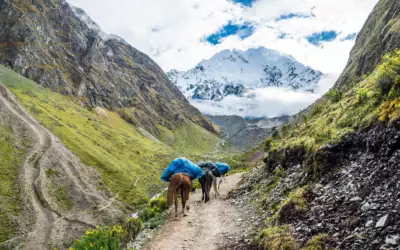
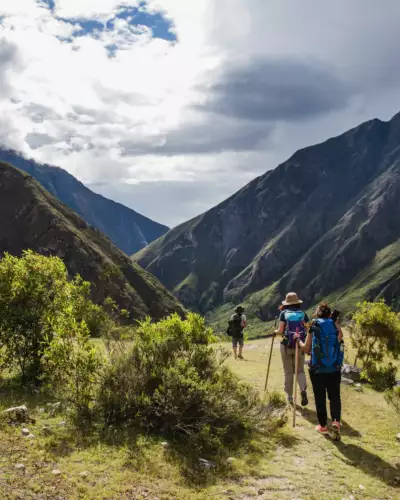
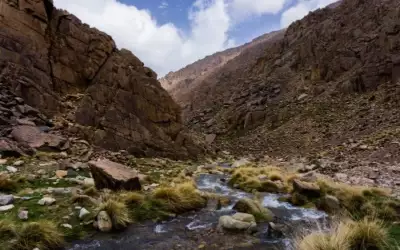
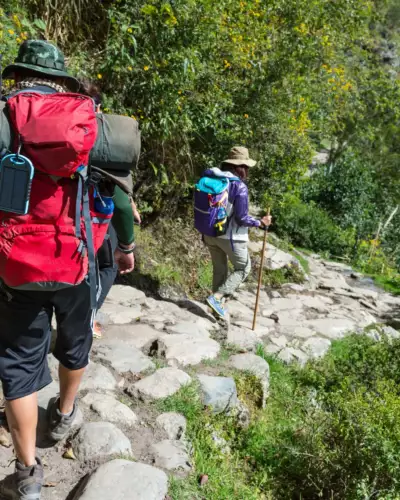
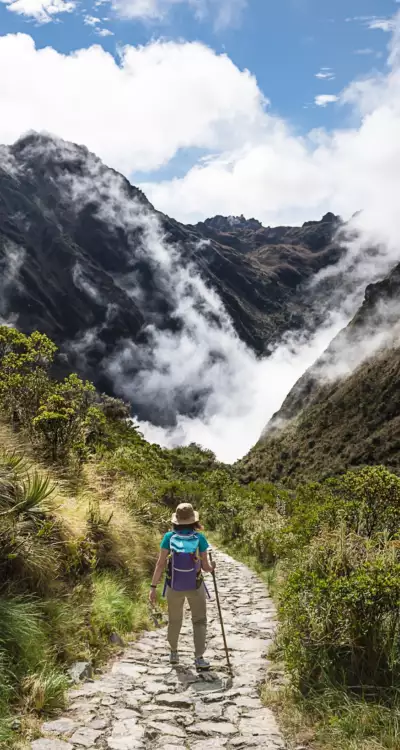
Trip Details
The onward flight to Cusco takes 1 hour 25 minutes, with up to 32 departures per day – our team will arrange this for you.
Upon arrival, you will meet the local Tribal Tracks team, and they will transfer you to your hotel in Cusco, where you can rest before venturing out to enjoy some sites. The air is much thinner here, so take it easy! You will have dinner in a local restaurant this evening.
Accommodation and Meals
Overnight in twin share 3*hotel, dinner.
This is the day to explore the main sites and get used to the altitude. We suggest that you take it easy, and make sure that you hydrate adequately. Altitude can cause dehydration very quickly, so drink often!!!
After breakfast in the hotel, explore under your own steam, or join your TT leader for a walk around the main sites. Cusco has many great restaurants so we have deliberately allowed you to choose where you want to eat lunch and try the local cuisine! You may want to rest in the afternoon, or continue your exploration of the sites, before joining the rest of the team for another supper in a local restaurant
Accommodation and Meals
Overnight in twin share 3*hotel, breakfast, dinner.
This is your final day acclimatising in Cusco before the trek!
We suggest that you continue your exploration of Cusco, getting used to the altitude and getting your legs moving. Again, your TT leader will co-ordinate some destinations, or you can simply explore on your own.
This evening at supper, there will be a pre-trek briefing and you should get an early night, ready for the days ahead!
Accommodation and Meals
Overnight in twin share 3* hotel, breakfast, dinner.
After breakfast, our trek begins at the small village of Challacancha high above the Rio Blanco Valley.
Following a wide, well established track we will gently make our way up the side of the valley covering a distance of about 16km /9.9 miles and climbing 1200m /3937ft. The views throughout the day are fantastic, all around us are verdant green mountains, along the path are a wide variety of native plants and flowers with birds flitting in and out and towards the end of the day we'll see the snow-capped peaks of Humantay and Salkantay (the Savage) looming high above us.
Our campsite for tonight is at Soraypampa (4000m / 12750ft.), the nights can get pretty chilly here so it's a good idea to put on your hat and gloves before you go to sleep.
Trekking 16km, roughly 8hrs.
Accommodation and Meals
Overnight camping in twin share tents, full board.
Today is the hardest day of the trek but also the most beautiful.
The scenery throughout the day goes from one extreme to another; starting from the high Puna covered in Ichu grass we make our way up and over the Salkantay pass (4650m/15255ft) where everything is rock and ice and then descend the far side down to the warm and lush cloud forest below. Along the way we'll see a variety of wildlife from the small finches that scrape by at the higher altitudes to hummingbirds and toucans in the cloud forest, there is also a chance to see Andean Fox, White Tailed Deer and Viscacha (rabbit-like Chinchillas).
Our campsite for tonight is at Colpapampa (2900m / 9514ft).
Trekking 21.2km, roughly 11 hrs.
Accommodation and Meals
Overnight camping in twin share tents, full board.
Our destination today is the village of La Playa, which is a welcome mostly downhill descent down the valley from Colpapampa.
Our route takes us along the Lluskamayo River through an area that is teeming with life and that has various coffee and fruit plantations. The scenery in this area is not as varied as the previous day but the warmth and lush vegetation are a welcome respite from the high mountains we've left behind.
Tonight we will stay at the village of La Playa (2400m / 7874ft.) where you can try some of the locally grown coffee. If you are interested there is the option to visit some hot springs that are close by – you can let the team know if you want to do this.
Trekking 15.6km, roughly 7 hrs.
Accommodation and Meals
Overnight camping in twin share tents, full board.
Today is the final stretch of the trek before we reach Aguas Calientes at the base of Machu Picchu.
The main focus of today is a visit to the Inca site of Llactapata sat on the mountainside high above (2650m/8694ft). Following an original Inca Trail we'll arrive in Llactapata by early to mid-morning and can enjoy the fantastic first views of Machu Picchu that we will get from here.
After a tour of Llactapata in which we'll learn about the Inca people and their culture, we'll head back down the mountainside to the Hydroelectric Station from where we'll walk to Aguas Calientes (2040m/6692ft).
Trekking 24km, roughly 8 hrs.
Accommodation and Meals
Overnight 3* twin share hotel Aguas Calientes, full board.
Waking up early we'll trek in the dark up to Machu Picchu to enter the site as it opens (NB if feet are sore there is the option to take the bus). It will take 1.5 to 2 hours.
We'll have a 2 hour guided tour of the site during which you'll learn about the Incas and visit all the most important areas of the citadel. After your tour you'll have free time to explore the site by yourself and if you have permits (which we can arrange), to climb either Huayna Picchu or Machu Picchu mountain.
In the late afternoon, we take the Panoramic/Vistadome train back to Ollantaytambo from where you will carry on by bus back to Cusco.
Accommodation and Meals
Overnight in twin share 3 *hotel, breakfast, dinner.
Relax, recover and reflect on your achievement! Today is a day for final sightseeing, a bit of shopping, or importantly, a day for you to reflect on what you have achieved together as a group.
This evening there will be a celebration meal in a local restaurant, the Tunupa Restaurant, allowing you to let your hair down after a tremendous effort. It’s billed as an unforgettable night of entertainment with an exciting performance of traditional dance, live music, and delicious Novo-Andean cuisine!
Accommodation and Meals
Overnight in twin share 3*hotel, breakfast, celebration dinner.
Trip Details

Trip Details
This is what you will need to buy/source yourself.
It is important that you read the itinerary carefully, and take account of the rating we have given it.
Although our challenges are not technical, they do require a good degree of physical fitness. The conditions will require stamina and strength, which you should recognise and train for. This will be a much better experience if you are fit and prepared. You should feel comfortable walking 6-8 hours per day.
In setting the maximum size of our groups, we take a number of factors into account.
Altitude, degree of difficulty, the terrain, the climate and time of year, all determine the maximum group size. Sometimes it will be 20, sometimes it will be 8-14, but safety is always our priority.
The minimum number to participate is 2. You will be accompanied by a Tribal Tracks UK Leader, Mountain Leader qualified, as well as supported by our local, in-country guides.
It is a requirement of Tribal Tracks booking terms and conditions that each supporter must hold their own travel insurance which covers the trip and the activities they are doing.
We advise you to put insurance in place as soon as possible. Your insurance must be valid and in date, covering the entire period that you are travelling for, including the return journey home. It should cover medical and personal accident risks, and should include repatriation costs and air ambulance or helicopter rescue services, where appropriate. We are happy to help you if you have any queries about this or have any difficulties.
Tribal Tracks has 100% Financial Protection and has a trust account with the Protected Trust Service, member number 5566.
This means that all client monies paid to Tribal Tracks are held in our dedicated trust account, which is supervised by an independent trustee. This means that in the very unlikely event that Tribal Tracks ceases to trade, your money is safe. For more information, please visit this link. Any flights booked for you by Tribal Tracks will be ATOL protected under our own ATOL certificate.
Tribal Tracks considers the safety of all of its participants and staff to be a top priority, and as such we have thorough safety systems in place.
In the event of an injury, we have an evacuation plan in place for all elements of the trek route. We do ask that you look after yourself during the trek in the following way, as this will help avoid unnecessary problems:
We know that the unexpected can happen.
While you are away, things can happen at home and people may need to get in contact with you. This can be tricky when you are in remote areas. So, shortly before departure, we provide you with an Emergency Procedure document to distribute to your nearest and dearest. This sets out how to contact Tribal Tracks and the steps Tribal Tracks will then take to get in contact with you.
It is really important that you are well prepared for your physical challenge and that you are confident that you will be able to fully participate.
Although our leaders are well trained to deal with different capabilities, if they have any concerns about someone’s ability to safely partake in the trek, or their impact on other people’s enjoyment, we authorise them to take necessary action which, in some circumstances, may involve asking someone to step out of the trek. Although this is a very rare occurrence, by booking this trip you agree to section 11 of our Booking Conditions which clearly states that our leaders have the authority to do this. In these circumstances, we will ensure anyone sitting out is safely provided for and offered alternative options where possible. Refunds will not be provided for activities missed and customers may be liable for additional costs incurred.
At Tribal Tracks, Responsible Travel is enormously important to us, and our commitment to responsible travel is evidenced in every itinerary that we prepare.
Core to our business is the belief that holidays can and should be enjoyable to the traveller but should be conducted in a socially, environmentally and economically responsible manner which brings benefit to local communities. This is implemented through a variety of measures which can be found in our Responsible Travel policy - http://www.tribaltracks.co.uk/responsible-travel-policy. We encourage you to read this and to play your own part in travelling responsibly.
Trip Details
Trip Details
The trek is a challenge. We will be walking for a long time over sometimes challenging terrain with steep ascents and descents.
The best way to build endurance fitness is to start with some gentle walks and gradually build up both the distance and duration over the next few months. In the last 2 months, we would recommend to go out and do long days, ideally in the hills, to build up the strength in your legs. About a week before the trek, limit any training to short walks – you want to have fresh legs at the start!
For the trek you should be comfortable trekking between 6 - 8 hours per day, but remember we have all day to achieve the distances and will not be going at racing snake pace. It may sound obvious, but make sure that you are walking properly, hitting the ground with your heel first, then rolling onto your toe, which pushes you onto the next step (this will help reduce the risk of shin splints and tendon pulls). Walk with your head up, eyes forward and shoulders level.
It is a good idea to develop a level of cardiovascular fitness (exercising and strengthening your heart and lungs). This comes from running, cycling or swimming for between 20 minutes and an hour, and will really help develop your endurance fitness. Three sessions a week is normally advised, increasing time and distance over time.
Replicate conditions in training i.e., use all the kit you will be using and try your walking poles if you want to use them.
It is important to pack so that you know where everything is. Separating kit into different packing cubes, or even plastic bags can really help with this. You can pack by item (eg socks and pants in one cube, tops in another etc) or by day, putting your entire outfit for that day together in one place. Taking an extra bag or cube to separate dirty kit is a great idea.
You will have two bags on the trip - your main bag and your back pack.
You should operate on the basis that you will not have access to your main bag during the day and while you are trekking. This means that it is important to have everything you need in your back pack. Waterproofs should go in the bottom, together with an extra layer, sunscreen and sunglasses, plus hat and gloves (if you are in a colder climate). You should also have your water bottles, and any specific snacks, medicines or first aid items you want to take, such as zinc tape and blister plasters. Baby wipes/toilet roll and nappy sacks are also essential for going to the toilet while you are trekking - we will explain more in the pre-departure briefing!
In the event of an injury, we have an evacuation plan in place for all elements of the trek route. We do ask that you look after yourself during the trek in the following way, as this will help avoid unnecessary problems:
We will brief you in the pre-departure briefing as to the catering specifically for your trip. However, as a guide, each morning you will be provided with a very filling local breakfast, usually accompanied by tea or coffee. Lunch will be during your trek and will be prepared by the team of cooks or we will utilise local restaurants or teahouses. Food will always be ample and tasty. If wild camping, dinner will be in the dining tent and will be traditional, freshly prepared food. If you are staying in a hotel or teahouse, dinner will be served there. Water, tea and coffee will be served and alcohol will usually not be available, although there will be some exceptions. We will provide 4 litres of drinking water per person per day. You will need to fill up 2 litres at breakfast and another 2 litres at lunchtime.
Please ensure that you have notified us before departure if you have any specific dietary requirements or allergies as we can cater for most.
Please inform us of any dietary requirements or allergies before you travel, and preferably at the time of booking. We can cater for almost all diets, so please just let us know. We can't cater for you if we don't know what you need!
You will sleep in shared tents (unless a single supplement has been requested). Mattresses are provided, which makes it much more comfortable! There will be a central dining tent available with rugs and lights where the group can get together in the evening, share stories and enjoy meals. There will also be an open fire wherever it is possible.
Sleeping bags are designed to work by trapping your body heat in the down surrounding you. If you wear lots of layers, your body heat will not be able to escape as effectively, and you will be cold. Wearing a thin thermal layer is ideal. It does sound counter intuitive, but we promise that it works!
Putting your clothes for the next day in the bottom of your sleeping bag will also help with warmth, as it will fill up any spare space around your feet, and it will mean your clothes are nicely warmed up in the morning.
If you find it difficult to sleep without a pillow, we recommend that you take a travel pillow and a regular pillowcase with you. Put your pillow in the pillow case, and use your down jacket/layers to fill out the pillowcase, you will end up with a pretty decent pillow!
And as for stuff or roll when it comes to packing your bag away? We are very much in the stuff camp!
There will be early morning starts, typically around 0600 - 0700hrs, so that the team can set off on the trek in good time. It is important that you pack up your kit before breakfast and leave your bag outside your tent or accommodation so that the crew can load them onto the jeeps and/or mules. There will be a freshly cooked lunch provided on your trek route. The aim is to get into camp before sunset if possible, when you can enjoy a hot drink and snacks. It is important that you change into your thermals and put layers on when you get into camp as the temperatures can drop sharply and you need to keep warm.
In the morning, the Tribal Tracks leader will wake up the group. When you hear the call, please begin to get ready, and pack all your kit away in your 'main bag' before breakfast. Put this bag outside your tent or accommodation as the crew can then begin to break down the tents/load the luggage. Ensure that you have all that you need in your backpack for the day, as you will not have access to your main bag until the next camp (see 'What do I put in my backpack?).
When you arrive into camp, it is important to get changed into different clothes, usually the ones that you will be wearing the next day. Even if you have had dry weather, you will have been sweating, and your clothes will be damp. As the sun sets and the air cools, you will quickly feel cold. Before this, you will want to freshen up and we recommend the 'baby wipe bath'. As there are no showers while on the trek, having a freshen up with a baby wipe will help keep you clean and will make you feel much better, before you put your clean clothes on. Unpack your sleeping bag and get everything out that you need for nighttime, such as your warm hat, jacket, head torch and book. Sort out your back pack for the next day by removing rubbish and replenishing snacks etc.
Doing this before dinner will mean you can get into your sleeping bag quickly, when it is likely to feel cold.
There will be a toilet tent and water supplied for washing in the morning where we can. There are no shower facilities provided during the trek and there will be no toilets either, but there will be a toilet tent in camp in the evenings and mornings. In the pre-departure briefing, we will tell you all that you need to know about how to deal with this.
For up-to-date vaccinations information please visit the NHS website ‘Fit for Travel’ at: http://www.fitfortravel.nhs.uk. The Tribal Tracks team are travel professionals, but we are not medical experts, and we would encourage you to visit your GP or travel nurse to discuss vaccination requirements. Please remember to take your itinerary with you so that they can see where you will be travelling. You should make an appointment at least 3-4 months before you travel.
In addition, please note that information on vaccinations can change at short notice; we recommend that you contact your Medical Professional or a Travel Health Clinic at least 8 weeks prior to departure for the most up to date information.
We recommend that you bring a multi-region adapter plug with you. There will be no facility to recharge electrical items on the trek, so we recommend you bring a power bank to top up the charge. We also recommend putting your phone on Airplane mode during the day to save on power.
Using your mobile overseas can sometimes attract unwelcome, very high tariffs. We recommend that you check with your network provider before you travel, but if in doubt, keep your phone switched to Airplane mode and use it only when there is WiFi. Reception can also be patchy, and unreliable, particularly in remote areas, which is why we carry a satellite phone with us. Please let your nearest and dearest know about this, and warn them that you may not be able to be in regular contact.
We ask that your luggage is kept to the absolute minimum. We will tell you the weights that you should not exceed, but usually, your main bag should not exceed 23kgs in weight.
It is important that you wear, or take your trekking boots with you in your hand luggage on the flight, as they are vital for the trek and cannot be replaced in the event of lost luggage.
We recommend leaving behind items such as high value jewellery, watches etc. Your passport and money should be always kept on you.
Trip Details
There are many option to extend your stay in Peru, or even to explore other countries in South America. Please contact us for further details.
Let’s get you on the right track!